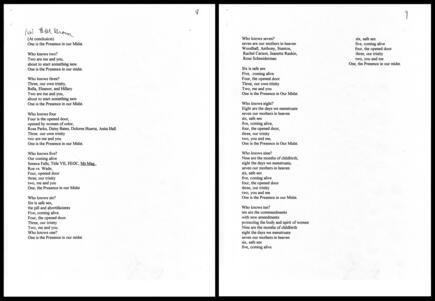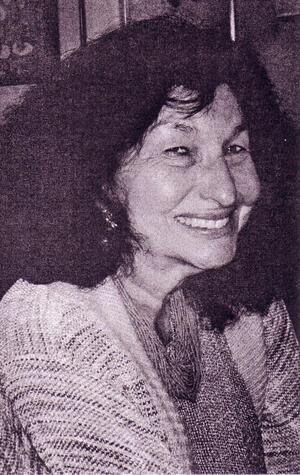E.M. Broner
Each year since 1976, the “Seder Sisters” have met for their own Women’s Passover. I had co-written The Women’s Haggadah with Nomi Nimrod. The group reads from that text – with the original feminist substitution for the males: the Wise Women, the Four Daughters, the Women’s Questions, the Women’s Plagues, and our own “Dayenu.” The Haggadah is xeroxed and passed around to the guests so we can all participate, pray, question, harangue, and celebrate together. When the book was published by Harper San Francisco, our first artifact was formalized. And, as the decades passed, artifacts have accumulated. There was “The Sacred Schmata (rag),” a shlocky pink strip of nylon, roped and knotted together, with which we enwrapped ourselves and one another to proclaim that we were community.
Our artifacts were altered by the death of one of our beloved members, Bella Abzug. We now have, in addition to Elijah’s Cup and Miriam’s Cup, Bella’s Cup. In the course of the seder, we “tell Bella stories.” And, for the first time, we printed the Yiddish song she sang with each of the four cups of wine, “Der Becher.” We began another custom, leaving a chair empty except for a large hat.
We began using other artifacts – herbs (rosemary or such) with which we graced the lintels, and we gave each of the participants a sprig to protect her. And we declared our surroundings a sacred place.
Each of the participants prepares her own story, midrash, or song depending upon the theme. For one seder I wrote a new “Who knows One.”
And I would continue to write songs:
This holiday we take for ourselves,
no longer silent servers behind the curtain,
but singers of the seder,
with voices of gladness,
creating our own convocation,
and leaving “The Narrow Place” together.
This is a narrative of a community that is not in isolation but reflects the polis of the time. It is a community of regulars and also invited guests so that the word can be spread – that women are celebrants, can write their own siddurim (prayerbooks), narrate their own Torah.
This is the oldest Feminist Seder and the model upon which many others are based. We are about to enter our 30th year together.
E.M. Broner, Ph.D., Professor Emerita, is the author of ten books, including The Women's Haggadah; Weave of Women; The Telling: The Story of a Group of Jewish Women Who Journey to Spirituality through Community and Ceremony; and Mornings and Mourning: A Kaddish Journal. Broner also wrote radio scripts for National Public Radio and plays. Her musical, “Higginson: An American Life,” premiered June 17, 2005, by the Michigan Opera Company (Broner, book & lyrics; Mort Zieve, music). Broner led the original Women's Seder for 30 years and was proclaimed a Wonder Woman by the Wonder Woman Foundation for her work in feminist Jewish ritual. She was married to the printmaker/painter Robert Broner, with whom she had four grown children. Broner died in 2011.




